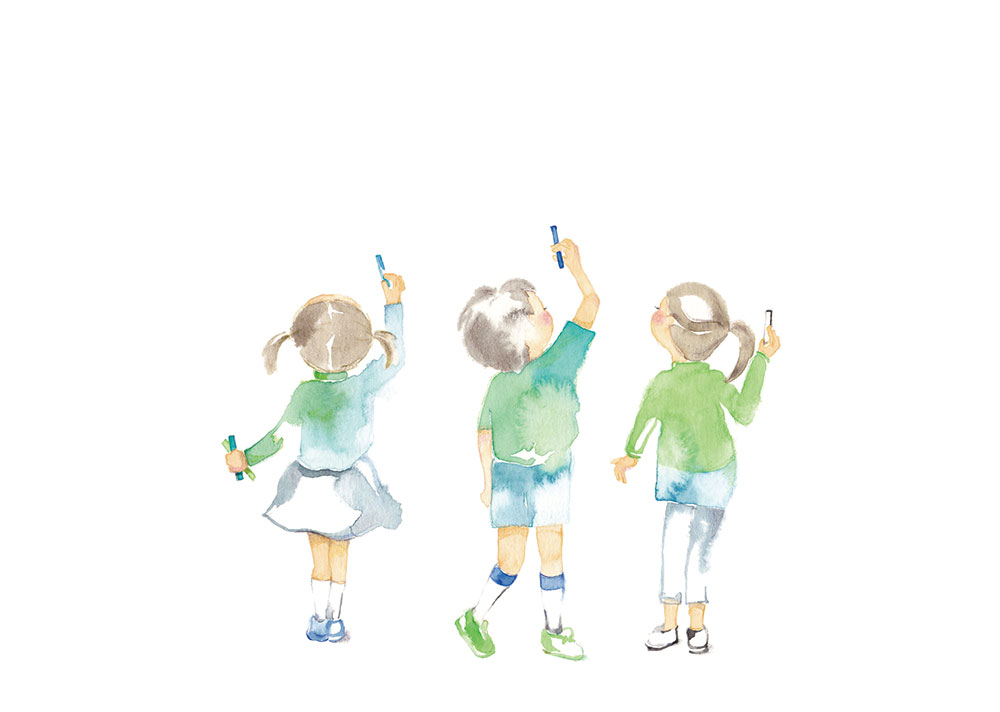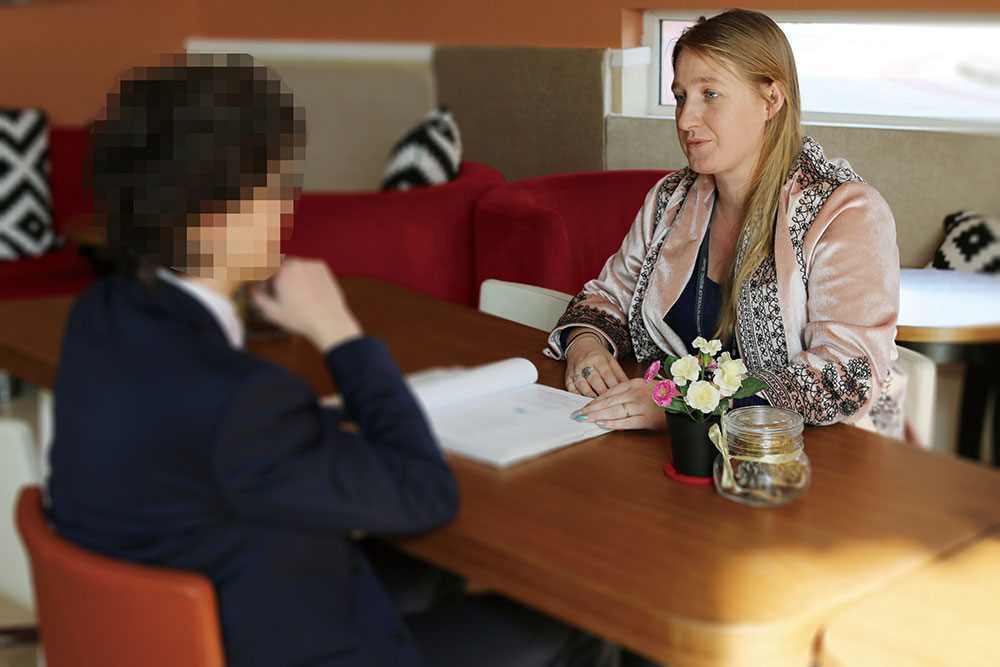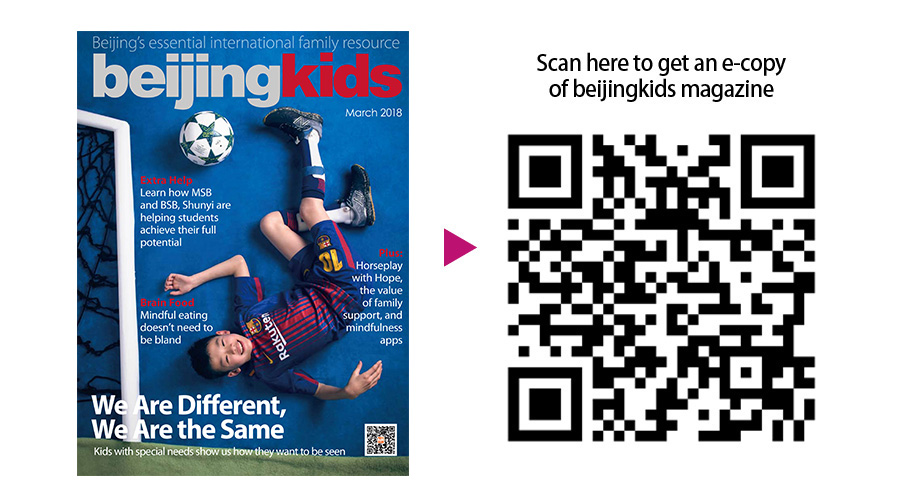We all like to think our kids are special – and of course, they are. Usually, though we prefer to focus on what they excel in: their creativity, talents, and diligence. However sometimes our children need a little extra help, whether that’s with achieving their potential academically or managing their emotions and behavior.
This can be hard for parents to admit to. However, educators are unanimous that getting children the support they need to achieve their full potential is no more than good parenting. To find out how students in Beijing’s international community are supported, we talked to heads of Learning Support at two very different schools.
Geraldine Solis is the Head of Learning Support at The International Montessori School of Beijing (MSB), which has 400 students aged from 18 months to 12 years.
“We talk about our role as the 3 C’s,” she tells us, “collaboration, consultation, and coordination. We collaborate with teachers, parents, and external experts to establish needs. We’re consultants to the teachers in the classroom, we serve as a resource for parents as well as teachers, help with evidence-based interventions. At the same time, we coordinate teams and support the members of staff developing ILPs (Individual Learning Plans). We’re also training personal learning assistants, we have foreign interns, we initiate Personal Development training for teachers.”
The children she supports have a range of needs.
“We have around 32 kids receiving active support or being monitored. They’re cases which were flagged by teachers, and we provide support, ideas, and strategies to help them. They might have autism, global developmental delay, attention deficit hyperactivity disorder (ADHD), specific learning disabilities, anxiety disorders, sensory processing disorders, behavioral and emotional challenges, or speech, language and fluency difficulties.”

At The British School of Beijing, Shunyi (BSB Shunyi), Rebecca Mazie, Head of Additional Educational Needs, sees a similar diversity.
“We have students with varying needs,” she told us. “We offer a few different pathways to receive support: at the mildest end, we have students who don’t really require a huge amount of support. There might be pastoral issues, particularly transition issues. They might miss home or struggle with a new language and new expectations.
Transition is difficult, it can be difficult for adults! It’s a temporary thing kids will go through. With the right support and monitoring, and communication with home, they will come through and be stronger at the end of it.”
Solis also highlights the importance of distinguishing learning difficulties from the challenges faced by children in an international environment.

“At MSB we’re very careful in referring students coming from culturally and linguistically diverse backgrounds. We carry out assessments before jumping into ‘this is a learning support referral.’”
However, some children will need longer-term help.
“We have a monitoring process,” Mazie explains. “It might be that the parents are concerned, or based on feedback from teachers, form tutors, or heads of year. We have a high teacher-to-student ratio, so for students who are struggling we can keep a close eye, and feedback on what’s working. We can put in place classroom accommodations, such as the use of laptops. Really simple changes can make all of the difference: so for example if a student has auditory processing difficulties, making sure that we give instructions broken down really clearly or written down, and then checking their comprehension.
“For students who have greater needs, we can specifically target them, and build in withdrawal support. For dyslexia, we might offer help with spelling, reading comprehension, independent writing, proof-checking, and editing – the type of study skills they will use for the rest of their life.
“We tailor the support to the individual. We communicate with parents, with teachers, and from secondary age we start to communicate with the student themselves a lot more. Even in Year 7 [Grade 6] they can be quite insightful, and draw attention to things you haven’t noticed. A sense of ownership can help to drive their progress.”
Solis agrees on the importance of communication.
“With parents, we have communication notebooks, especially for those with ILPs (which are only used for high needs). Those notebooks have all the things that we do; we want to make sure not only that the parents know what we’re doing, but also that they can apply it at home. If parents have things they want to share from home they can write it in the notebook. It’s very effective, the notebook goes back and forth. One kid is on their fourth notebook!
“One of the keys to communication is understanding culture,” she continues, “especially in an international school. It’s important parents understand that we are here to be part of your journey, to help you find solutions. It’s not about labeling the child. We have labels to guide us on strategies, but we separate the child from the label. I’m proud to say we have very supportive families. Parents are telling us to increase the sessions, which reflects that the strategy is working.”
“If I’m trying to explain something about a sensitive topic,” Mazie says, “the biggest challenge is to broach things that are uncomfortable for people to hear. You have to remain positive in the way you feedback. A lot of people can feel judged as parents, so one of my jobs is to make it clear that at BSB Shunyi we don’t have problems I would worry about, we don’t have behavior which is highly concerning. All we have is students we want to do better. We focus on what they’re doing well, what their strengths are so we can draw them out too, and say: ‘here’s an area we can support your child better, where small changes can give a better result.’”
We ask whether special needs are still a taboo subject in China.
“I don’t think they’re taboo,” she answers, “but some people don’t believe some things exist! It’s part of the globalization of education and mental health issues, things that make sense in our culture are not an appropriate way to speak to everybody. At heart, we have a child, an individual who has their own way of expressing themselves, of seeing the world, and around that child, there are people who love them and care for them. Instead of saying ‘autism’, we can say the child has problems making friends, and with attention. We can focus on positive strategies to help them, rather than arguing about vocabulary.
“The worry for parents is we are going to label the child and give up on them; if we say ‘your child is autistic,’ then that is who he is, that’s all we’ll ever expect of him. It can be a generational thing, that grandparents don’t want these labels, but even for western pare, ts it can be very difficult to accept sometimes. So I can use this vocabulary in my notebook, but when talking to parents I’ll say ‘your daughter has these difficulties, this is the kind of support we’re going to offer.’ I focus on the kid as an individual, not on the label.”
Solis too sees a change happening.
“Honestly, people are more open for discussion. I was even surprised, when I attended a conference last year, that more parents were there. Part of it is because families are trying to educate themselves. There’s increased awareness of disorders, and openness and understanding come with education and awareness.”
Seeing the achievements of children with special needs can help with raising awareness, she says.
“We have a child diagnosed with Autistic Spectrum Disorder (ASD) and ADHD who overcame the social and emotional challenges that go with these disorders, and took part a major role in one of the school’s biggest projects. That changed the way the child perceived themselves, and also opened up doors for that student, since the school community could see what that child can actually achieve.
“Another child was very anxious, crying all the time coming to school. Now this child not just comes in happy, but engages in work independently. They’re so motivated, the skills they’ve achieved makes them ahead of their peers. The child is so proud, and tells their parents ‘I’m so ready for the next grade!’ That’s the definition of success: a child who believes in what they can do and takes on a challenge. The label doesn’t limit the child.”
Mazie has achieved similar successes with older students.
“We have a student who has complex needs, a couple of different issues that intersect making sitting down and focusing really difficult. He’s coming towards the top end of school, so the big thing is exams and qualifications, keeping him focused and supported.
“Last year he did GCSEs. If he could show everything he knows he’d get an A star, but the system creates a barrier, so we worked really hard, and his results were better than expected. It got to the point where he re-sat one exam because he needed a C but came out with D. He retook it and got a B! I try to stay professional but I had tears in my eyes. I’m so proud of how hard he worked, and I feel honored to be part of getting him where he needs to go.”
Solis though sounds a note of caution.

“I want to make sure,” she says, “that people understand that even when individuals diagnosed with autism spectrum disorders attend universities, it doesn’t mean that their autism went away, or when our students achieve something that the struggles end. It is a journey, and in every stage they will face some challenges that are associated with the disorder, and they continue to require the support of educators, families, and the community.”
“Human beings are incredibly complicated,” Mazie concludes. “Computers are less complicated and they have problems! Reading, writing, and mathematics have only existed for 10,000 years, and we’re trying to fit the rainbow of humanity into an IB profile – you’ll always find a few edges. If we can support them they have every opportunity to succeed in what they want to do in life.”

Photos: courtesy of MSB, BSB Shunyi
This article appeared on p38-39 of beijingkids March 2018 issue.




